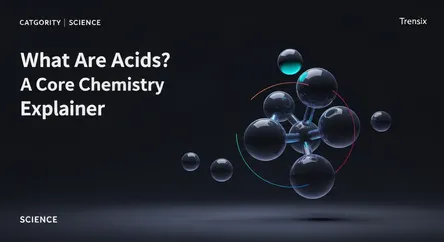Science
What Are Acids? A Core Chemistry Explainer

An introduction to acids, fundamental chemical compounds that play a crucial role in our daily lives, from the food we eat to industrial processes.
What is it?
An acid is a molecule or ion that can donate a proton (a hydrogen ion, H+) or, in a broader sense, form a covalent bond by accepting an electron pair. When dissolved in water, acids increase the concentration of hydrogen ions, resulting in a solution with a pH value of less than 7. This property gives them their characteristic sour taste, the ability to turn blue litmus paper red, and the capacity to react with metals and bases to form salts. There are several ways to define acids, including the Arrhenius, Brønsted-Lowry, and Lewis theories, which focus on their behavior in water, their role as proton donors, and their ability to accept electron pairs, respectively.
Why is it trending?
The study of acids remains a cornerstone of chemistry and is perpetually relevant due to its wide-ranging applications and importance in understanding biological and environmental processes. Acids are fundamental to countless industries, including the production of fertilizers, pharmaceuticals, and other chemicals. In biology, amino acids are the building blocks of proteins, and nucleic acids like DNA carry genetic information. Furthermore, discussions around health, like the function of stomach acid in digestion and conditions like acid reflux, keep the topic in the public eye. The concept is also central to environmental science, from understanding ocean acidification to the impact of industrial emissions.
How does it affect people?
Acids are integral to daily life. Many foods we consume are acidic; for example, citrus fruits contain citric acid, and vinegar contains acetic acid, which is also used for cleaning and food preservation. In our bodies, hydrochloric acid in the stomach is essential for digesting food. Industrially, strong acids like sulfuric acid are vital for manufacturing processes, including the production of car batteries and fertilizers. From the flavor of our food to the function of our bodies and the products we use every day, the chemical properties of acids have a profound and direct impact on human life.